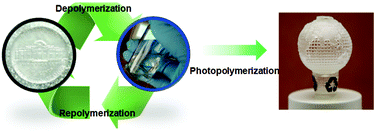Chemical recycling of poly(thiourethane) thermosets enabled by dynamic thiourethane bonds†
Abstract
Recycling of polyurethanes is largely infeasible due to the harsh reprocessing conditions and associated risks of side reactions and degradation whereas polymer networks incorporating dynamic covalent bonds represent an attractive approach to the design of recyclable materials. Here, we report findings on the dynamic nature of thiourethanes, and their application as a new class of recyclable analogs of urethane materials. A series of small molecule experiments was initially conducted to determine the equilibrium constant and exchange reaction kinetic constant for the thiol–isocyanate reaction. Furthermore, incorporating those thiourethane moieties into a cross-linked network resulted in thermoset materials that are readily depolymerized to liquid oligomers. The resultant oligomers can be re-crosslinked to thiourethanes without any loss of performance nor change in mechanical properties (peak stress of 25 MPa with max strain of 200%). Moreover, the recycled thiol oligomers from thiourethane network polymers could potentially be transformed into other materials with mechanical properties that exceed those of the initial, pristine thiourethane materials. Overall, the ease with which these polythiourethanes are polymerized, recycled and reformulated gives a new direction and hope in the design of sustainable polymers.



 Please wait while we load your content...
Please wait while we load your content...